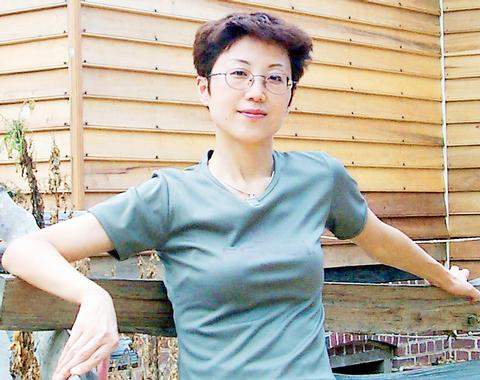China yesterday expelled a second US-based scholar convicted of spying and opened the door for the departure of a third ahead of fence-mending talks with the US this weekend.
Gao Zhan (
Shortly after Gao's plane took off, the Chinese foreign ministry announced medical parole had been granted to Qin Guangguang (

PHOTO: AFP
With US Secretary of State Colin Powell due in Beijing this weekend, there was no immediate word on when Qin, who works for a US medical group and is a visiting scholar at the University of Michigan, the University of Chicago and Stanford, would leave China.
Nor was there any word of progress on three other cases involving US citizen Wu Jianming (吳建民), held for spying for Taiwan, and permanent US residents Liu Yaping (劉亞平) and Teng Chunyan.
Liu is being detained over a business dispute and Teng is in a labor camp for her participation in the outlawed Falun Gong spiritual movement.
Gao's Beijing lawyer said he had been notified late on Wednesday that the sociologist at American University in Washington had been granted medical parole.
The flurry of expulsions began on Wednesday when academic Li Shaomin (
Only hours after Li, a management professor at City University in Hong Kong, flew out of Beijing, Powell met Chinese Foreign Minister Tang Jiaxuan (
Washington had pushed the Chinese government -- "at every level," according to US spokesmen -- for Gao to be freed, and a senior US official accompanying Powell said Gao and Qin were discussed in the talks with Tang.
Powell is due to hold more top-level talks in Beijing on Saturday and the expulsions point to a serious attempt by China to improve relations with the US administration of President George W. Bush, which got off to a rocky start earlier this year.
Powell said he was very pleased Gao was on her way home but he has also made clear several times over the past few days that Washington is upset at such arrests.
On Wednesday, he said it was "not the individual cases that should be our greatest concern, but the whole process by which these people are detained and put on trial."

MORE VISITORS: The Tourism Administration said that it is seeing positive prospects in its efforts to expand the tourism market in North America and Europe Taiwan has been ranked as the cheapest place in the world to travel to this year, based on a list recommended by NerdWallet. The San Francisco-based personal finance company said that Taiwan topped the list of 16 nations it chose for budget travelers because US tourists do not need visas and travelers can easily have a good meal for less than US$10. A bus ride in Taipei costs just under US$0.50, while subway rides start at US$0.60, the firm said, adding that public transportation in Taiwan is easy to navigate. The firm also called Taiwan a “food lover’s paradise,” citing inexpensive breakfast stalls

TRADE: A mandatory declaration of origin for manufactured goods bound for the US is to take effect on May 7 to block China from exploiting Taiwan’s trade channels All products manufactured in Taiwan and exported to the US must include a signed declaration of origin starting on May 7, the Bureau of Foreign Trade announced yesterday. US President Donald Trump on April 2 imposed a 32 percent tariff on imports from Taiwan, but one week later announced a 90-day pause on its implementation. However, a universal 10 percent tariff was immediately applied to most imports from around the world. On April 12, the Trump administration further exempted computers, smartphones and semiconductors from the new tariffs. In response, President William Lai’s (賴清德) administration has introduced a series of countermeasures to support affected

CROSS-STRAIT: The vast majority of Taiwanese support maintaining the ‘status quo,’ while concern is rising about Beijing’s influence operations More than eight out of 10 Taiwanese reject Beijing’s “one country, two systems” framework for cross-strait relations, according to a survey released by the Mainland Affairs Council (MAC) on Thursday. The MAC’s latest quarterly survey found that 84.4 percent of respondents opposed Beijing’s “one country, two systems” formula for handling cross-strait relations — a figure consistent with past polling. Over the past three years, opposition to the framework has remained high, ranging from a low of 83.6 percent in April 2023 to a peak of 89.6 percent in April last year. In the most recent poll, 82.5 percent also rejected China’s

PLUGGING HOLES: The amendments would bring the legislation in line with systems found in other countries such as Japan and the US, Legislator Chen Kuan-ting said Democratic Progressive Party (DPP) Legislator Chen Kuan-ting (陳冠廷) has proposed amending national security legislation amid a spate of espionage cases. Potential gaps in security vetting procedures for personnel with access to sensitive information prompted him to propose the amendments, which would introduce changes to Article 14 of the Classified National Security Information Protection Act (國家機密保護法), Chen said yesterday. The proposal, which aims to enhance interagency vetting procedures and reduce the risk of classified information leaks, would establish a comprehensive security clearance system in Taiwan, he said. The amendment would require character and loyalty checks for civil servants and intelligence personnel prior to